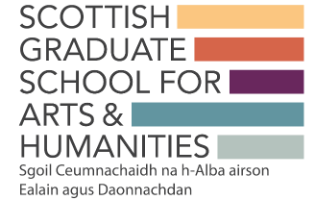Centre for Contemporary Art: Glasgow Seed Library
Published: 4 October 2023
An open brief to researchers to pursue an aspect of the seed library project and collection that connects with their own area of investigation.
Location
350 Sauchiehall Street, Glasgow, G2 3JD
We expect the researcher to have a high level of physical and embodied engagement with the seed library, the sites where we grow seeds and with the seed saving community. This would include regular involvement in our seed library talks, workshops, field days, socials and other events in a various locations around Glasgow, as well as joining the seed library team to work in the CCA office. Alongside this, some level of remote work is also possible.
Project
Drawing on feminist philosopher Donna Haraway’s proposition that “it matters which stories tell stories”, Glasgow Seed Library proposes a project that delves deeper and researches further the stories, journeys, myths, migrations, cultures, politics and practices associated with our collection of seeds and community of people.
The brief is open to researchers to pursue an aspect of the seed library project and collection that connects with their own area of investigation. This could include, but is not limited to:
- Scottish plant breeding and propagation
- plantation capitalism and the botany of empire
- seed trade between Scotland, Ireland and Europe
- indigenous agroecological practices
- a long history of climate resilience through plants
- seed sovereignty and seed monopolies
- land ownership and landworkers’ resistance
- crofting, the runrig system and seedsharing
- chemical kinship in pesticide and herbicide use
- ethnobotany and biodiversity in Scotland
- language and culture in naming of plants
- the relation between seed and human migrations
- seed saving in literature, storytelling and oral history
- seed keeping as queer methodology and making kin
- the various purposes for which people have bred and used plants in Glasgow and elsewhere: as food, medicine, material, dye, wildlife, magic and ritual
The project may involve conducting primary and secondary research into the histories of the seeds currently held by Glasgow Seed Library, as well as significant or overlooked heritage or heirloom seeds yet to join the collection. The research may be carried out using online databases, in various archives, through exchanges with seed-savers and through practice-led approaches and experimentation. The researcher will have access to CCA’s own archive and archivist, and will be encouraged to engage with other collections and archives in Glasgow.
The project is intended as a means to explore, share and disseminate the themes, findings and learning from research with a wider public. Our diverse Glasgow-based seed library community are participants and active co-producers of the seed library, and are therefore a priority audience. In addition, we work with many community groups and special-interest groups, and would invite researchers to consider carefully the ways they might engage and inspire particular groups of people, in accessible and innovative ways, with their research.
The project will be of interest to researchers from a range of backgrounds, including but not limited to: environmental, ecological or community arts practice; social history of art; cultural geography and anthropology; feminist science and technology studies; new materialist and posthumanist philosophy; ecocriticism; ethnobotany and paleobotany; critical plant studies; critical race, gender, queer and disability theory.
The resident researcher will be expected to demonstrate engagement with or commitment to feminist, decolonial, anti-racist and/or anti-ableist scholarship and methodologies.
Outputs
The researcher will achieve:
- a body of original research, a portion of which will be held in CCA’s archive and made available for the seed library community to explore in the future
- a public-facing workshop, digital repository or programme of events (the format to be agreed with the researcher) which helps to disseminate their research to a broader audience
Timescale
Start date (or must start by): January/February 2024
End date (or must end by): June/July 2024
Timescale is flexible. Suggested: 1-2 days / week, over six months.
Benefits to the Researcher
The researcher will:
- investigate an original topic of study and contribute to a wider community project
- work closely with seed library workers and volunteers with shared research interests and rich networks
- develop new relationships in the professional arts and cultural sector, including archives and collections
- build relationships and new ways of working with community groups and growing initiatives
- gain greater understanding of the division of labour and modes of production within an arts institution
- be supported to develop public-facing methods of disseminating and sharing their research
- have the opportunity to engage with a diverse and multi-vocal community of interest
Key Relationships
The researcher will have the opportunity to work with a range of people throughout the project. This will include:
- Professionals working directly on Glasgow Seed Library projects and events – Dr Rowan Lear, Louise King and Hamshya Rajkumar: growers, artists and researchers working with ideas and practices of growing, agriculture and botanical heritage.
- The wider team of curators and programmers at CCA, who represent a diversity of practices, experiences and specialisms, including film, writing, sculpture, digital and community engagement.
- The seed library community, composed of new growers, experienced gardeners, community growers, allotmenteers and market garden producers across the city of Glasgow.
- Partner community organisations, growing initiatives and other seed libraries in Scotland and beyond. This includes the community of Common Ground, a new CCA project steered by refugees, migrants and New Scots in Glasgow.
Person Specification
|
E |
D |
Essential/Desirable |
E |
D |
Essential/Desirable |
|
A1 – Knowledge Base |
C1 – Professional Conduct |
||||
|
|
X |
Subject Knowledge |
|
|
Health and Safety |
|
|
X |
Research methods – theoretical knowledge |
|
X |
Ethics, principles and sustainability |
|
|
X |
Research methods – Practical application |
|
|
Legal requirements |
|
|
X |
Information Seeking |
|
|
IPR and copyright |
|
|
X |
Information literacy and management |
|
X |
Respect and confidentiality |
|
|
|
Languages |
|
X |
Attribution and co-authorship |
|
X |
|
Academic literacy and numeracy |
|
X |
Appropriate practice |
|
A2 – Cognitive abilities |
C2 – Research management |
||||
|
|
X |
Analysing |
|
|
Research Strategy |
|
|
X |
Synthesising |
|
X |
Project planning and delivery |
|
X |
|
Critical thinking |
|
X |
Risk management |
|
|
X |
Evaluating |
|
|
|
|
X |
|
Problem Solving |
|
|
|
|
A3 – Creativity |
C3 – Finance, funding & resources |
||||
|
X |
|
Inquiring minds |
|
|
Income and funding generation |
|
|
X |
Intellectual insight |
|
|
Financial management |
|
|
X |
Innovation |
|
|
Infrastructure and resources |
|
|
|
Argument construction |
|
|
|
|
|
|
Intellectual risk |
|
|
|
|
B1 – Personal qualities |
D1 – Working with others |
||||
|
X |
|
Enthusiasm |
|
X |
Collegiality |
|
|
X |
Perseverance |
X |
|
Team working |
|
X |
|
Integrity |
|
|
People management |
|
|
|
Self-confidence |
|
|
Supervision |
|
|
X |
Self-reflection |
|
|
Mentoring |
|
|
X |
Responsibility |
|
|
Influence and leadership |
|
|
|
|
|
X |
Collaboration |
|
|
|
|
X |
|
Equality and diversity |
|
B2 – Self management |
D2 – Communication & dissemination |
||||
|
|
X |
Preparation and prioritisation |
|
X |
Communication methods |
|
|
X |
Commitment to research |
|
X |
Communication media |
|
|
|
Time management |
|
X |
Publication |
|
X |
|
Responsiveness to change |
|
|
|
|
|
|
Work-life balance |
|
|
|
|
B3 – Professional & career development |
D3 – Engagement and impact |
||||
|
|
|
Career management |
|
|
Teaching |
|
|
|
Continuing professional development |
X |
|
Public Engagement |
|
|
|
Responsiveness to opportunities |
|
|
Enterprise |
|
|
|
Networking |
|
|
Policy |
|
|
|
Reputation and esteem |
|
|
Society and culture |
|
|
|
|
|
X |
Global citizenship |
Click here to apply
First published: 4 October 2023



